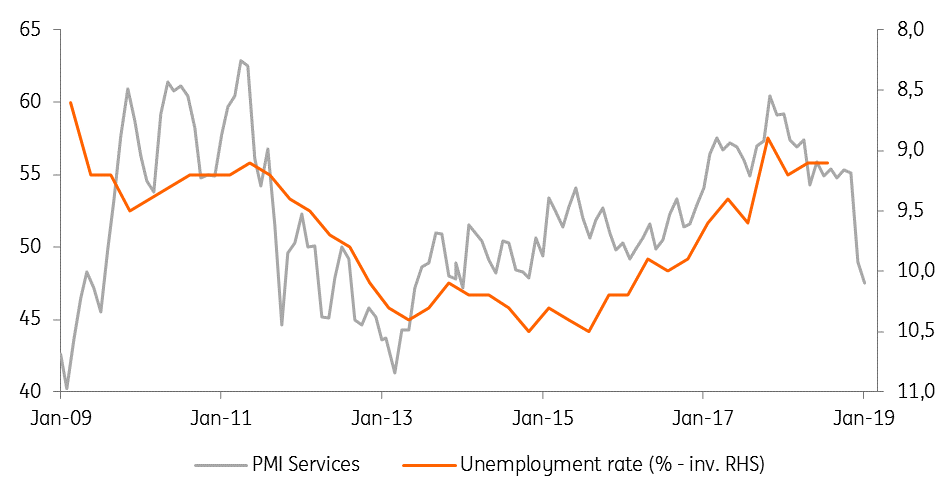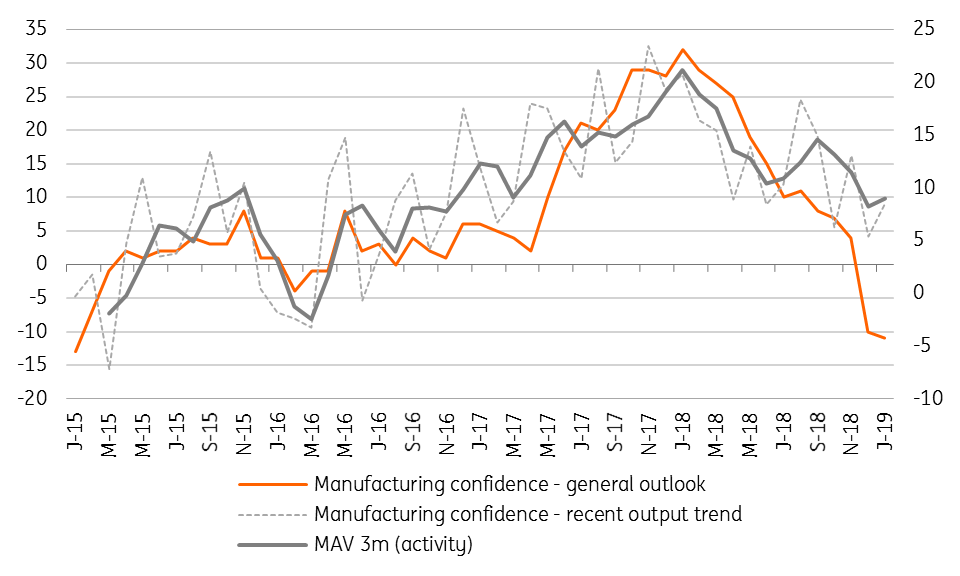France: Encouraging employment in 4Q
4Q19 figures were encouraging for the French labour market as they show that the downward trend in the number of unemployed continued until November despite the economic slowdown. However, it also shows the impact of the “yellow vest” crisis in December when unemployment rebounded. The last PMI surveys show the rebound is likely to be repeated in January
Encouraging 4Q for French employment despite grim December
The unemployed population was 3.4 million people in mainland France in the fourth quarter, according to the latest figures published by DARES. They imply a further decline in the number of unemployed, by 16,500 in the fourth quarter. In total, the year 2018 saw a drop of 44,300 for the main unemployed category (A), or 1.3% over one year.
Despite the slight rise in the number of occasional unemployed (Chart 1), the population around unemployment (DARES categories A to E) fell by 54,800 in 2018, for the first time in more than 10 years. Indeed, since the beginning of the crisis, this population has been increasing each year. The recent drop can be seen as an effect of the acceleration in growth in 2017. At a time when growth seems to be back to its trend level, we expect a further slight decline in the unemployed population in 2019, which should allow the unemployment rate to continue decreasing.
Positive fourth-quarter data, however, should not mask December's sluggish figures. The decline in activity and confidence suddenly provoked by the "yellow vests" movement has indeed left its mark since there has been a significant increase in the number of unemployed in categories A to C: 20,000 in one month, which has undoubtedly reduced the good overall result of 2018. If the unemployment rate declines in the last quarter of 2018 to 8.7% in mainland France, it could potentially rebound slightly in the first quarter.
2018: First decline in total unemployment since the beginning of the financial crisis

PMI Services sends worrying signals for employment in 1Q19
Indeed, the first signs of activity coming from the service sector have not been encouraging. At 47.5, the sector's PMI was at its lowest level since 2014. The indicator was still above 55.0 in November. This correction can be seen as the impact of the current high level of consumer anxiety in recent surveys and the "yellow vests" crisis. We believe that the weak PMI survey (details will be published in early February) could be a harbinger of investment intentions in the sector. This could also continue to impact employment growth in the months to come after the rise among some categories of unemployed in December (Chart 2). Even if the effect is temporary, it should delay by several months the fall in the unemployment rate, which could still be higher than 8.5% at the end of this year.
PMI indices point to a likely pause in 1Q19

Confidence looks better in manufacturing
In the manufacturing industry, confidence rebounded slightly in January, as confirmed by the recent PMI, rising from 49.7 to 51.2. Only December will have been below the 50.0 threshold under which industrial activity is assumed to be shrinking. Given the details of the survey published by INSEE, which also showed that confidence in the industry is stabilising in January, it seems that order books are no longer deteriorating and that recent output has been more significant than expected. Inventories even fell in January. However, confidence in the economic outlook remains at its lowest level in four years, showing that the "yellow vests" crisis continues to weigh on confidence. Note however (Figure 3) that the decline in activity is not as straightforward as that of morale.
At this stage, we still think that the French economy came to a standstill at the end of 2018. Given the slowdown in eurozone growth, we also think that the rebound will be limited, which lowers growth prospects for 2019 to 1.3%. In this context, the current round of national consultations by the Government is the only chance we see for reforms to gather support: economic growth momentum is not on President Macron’s side anymore.
Recent output is not as low as confidence

Download
Download article"THINK Outside" is a collection of specially commissioned content from third-party sources, such as economic think-tanks and academic institutions, that ING deems reliable and from non-research departments within ING. ING Bank N.V. ("ING") uses these sources to expand the range of opinions you can find on the THINK website. Some of these sources are not the property of or managed by ING, and therefore ING cannot always guarantee the correctness, completeness, actuality and quality of such sources, nor the availability at any given time of the data and information provided, and ING cannot accept any liability in this respect, insofar as this is permissible pursuant to the applicable laws and regulations.
This publication does not necessarily reflect the ING house view. This publication has been prepared solely for information purposes without regard to any particular user's investment objectives, financial situation, or means. The information in the publication is not an investment recommendation and it is not investment, legal or tax advice or an offer or solicitation to purchase or sell any financial instrument. Reasonable care has been taken to ensure that this publication is not untrue or misleading when published, but ING does not represent that it is accurate or complete. ING does not accept any liability for any direct, indirect or consequential loss arising from any use of this publication. Unless otherwise stated, any views, forecasts, or estimates are solely those of the author(s), as of the date of the publication and are subject to change without notice.
The distribution of this publication may be restricted by law or regulation in different jurisdictions and persons into whose possession this publication comes should inform themselves about, and observe, such restrictions.
Copyright and database rights protection exists in this report and it may not be reproduced, distributed or published by any person for any purpose without the prior express consent of ING. All rights are reserved.
ING Bank N.V. is authorised by the Dutch Central Bank and supervised by the European Central Bank (ECB), the Dutch Central Bank (DNB) and the Dutch Authority for the Financial Markets (AFM). ING Bank N.V. is incorporated in the Netherlands (Trade Register no. 33031431 Amsterdam).